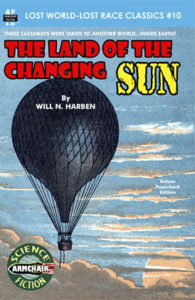 A couple of subgenres of science fiction I’ve had an interest in are utopian fantasies and hollow earth stories.
A couple of subgenres of science fiction I’ve had an interest in are utopian fantasies and hollow earth stories.
The first are usually about some society that is presented as better than ours. And often set in either an inaccessible location (a lost world of some kind) or in the future or some alternate reality. Some use it to push a certain political belief, many times some form of socialism. Others push a more refined spiritual society. Or a combination of both. There were many such works in the 1800s, less so in the 1900s and more recently.
Hollow earth stories are a specific subgenre of lost world fantasies, set either in the center of a supposedly hollow earth (usually with a central sun), or in an enormous cavern located below the surface. Examples of these works are Edgar Rice Burroughs‘ Pellucidar series or Jules Verne‘s Journey to the Center of the Earth. These stories can be the setting for wild adventures in a world with prehistoric creatures, like in the Pellucidar series, or allow the author to showcase an unknown, but “advanced” civilization.
A work that is in both of these genres is The Land of the Changing Sun, which was reprinted by Armchair Fiction in their “Lost World/Lost Race” series. Written by Will N. Harben (1858-1919), the novel appears to be one of the very very few forays into science fiction by this author. Published in 1894, it seems to have been rarely reprinted until Armchair Fiction’s edition. From what I gather, Harben was a fairly popular author in his time, mainly writing regional fiction set in the northern Georgia. But he seems to have been overlooked since then, though there are some of his works in ebook format.
The main characters are two balloonists, an American and an Englishman. When they loose control of their balloon over the Atlantic, they find a small deserted island to land on. Exploring it, they are found by a strange group of men who come up in a submarine in a lake on the island.
These men take the two (as more or less prisoners) into the depths to their land, which is called Alpha, and referred to as “the land of the changing sun.” A utopian society exists there, with a high level of technology, though they are aware of the societies on the “surface world” through various agents (who actually will recruit suitable people to join them in Alpha).
We learn the history of this land. It’s located in a cavern a hundred miles across (so not a true “hollow earth”). Two hundred years ago, the founder of Alpha discovered it with a crew of sailors, and also discovered the unusual nature of the atmosphere that provided health and well being. So they setup a new society in the cavern, adding to their number a group of colonists. Over time they had created an artificial sun which passes over the cavern similar to the sun. It changes color at set times, hence the name “the land of the changing sun.”
But all is not well in paradise. The two men are separated. While the Englishman has become a favorite of the princess, the American is dumped in the wilderness to die. He didn’t pass a physical, and all who fail to do so are so treated, to prevent passing along bad genes. But the American finds an Alphan recently dumped and they team up to try to get out of there.
Tragedy soon strikes. First the artificial Sun does not operate properly, causing a mild panic (kind of surprising for such an “advanced civilization”). Then worse, the American and his new friend discover that the ocean above has broken into the cavern of Alpha. They must warn the king of this danger or all are doomed.
It’s an interesting early science fiction tale. I could see it appearing in early pulps, or being an inspiration for such tales. I’m surprised it wasn’t reprinted in pulps like Famous Fantastic Mysteries. Thankfully Armchair Fiction has rescued this from relative obscurity. Check this out and others in their “Lost World/Lost Race” series.




Your comments